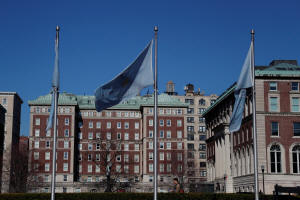|
The
markers, part of a university-wide project initiated by
President Lee Bollinger after the murder of George Floyd in May
2020, include signs at residence halls John Jay Hall and 50
Haven Avenue, formerly Bard Hall, noting that slave owners John
Jay and Samuel Bard had close ties to the university.
A marker at Furnald Hall will tell the story of a morning in
1924 when men in Ku Klux Klan robes and hoods burned a
seven-foot-tall wooden cross near the dormitory. Furnald was
home at the time to law student Frederick W. Wells, the first
Black student to live on-campus at Columbia during the academic
year. While the cross burned, students ran outside his door
shouting racist insults.
The high percentage of students of color, among them poet
Langston Hughes, who lived at Hartley Hall in the early 20th
century will be commemorated with a plaque there, according to
Columbia Professor Thai Jones, who taught a “Columbia & Slavery”
course and has led the effort to erect the markers.
Columbia will join Harvard Law School, Rutgers University, the
University of Mississippi and the University of South Carolina
in erecting plaques in recent years acknowledging the
institutions’ relationship to slavery.
Columbia's markers will be installed in the fall initially as
digital monitors and could become permanent plaques, according
to Jones.
(Reporting by Michela Moscufo; Editing by Donna Bryson and
Leslie Adler)
[© 2022 Thomson Reuters. All rights
reserved.]
This material may not be published,
broadcast, rewritten or redistributed.
Thompson Reuters is solely responsible for this content.

|
|




